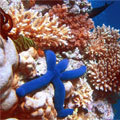Ecosystem Ecology
Editor(s):
|
What powers life? How do sunlight and nutrients affect the plants we depend on? How do greenhouse gases and other contaminants degrade the interactions among the plant, animal, and microbial populations that comprise ecosystems?
Ecosystem ecology is the study of these and other questions about the living and nonliving components within the environment, how these factors interact with each other, and how both natural and human-induced changes affect how they function.
Understanding how ecosystems work begins with an understanding of how sunlight is converted into usable energy, the importance of nutrient cycling, and the impact mankind has on the environment. Plants convert sunlight into usable forms of energy that are carbon based. Primary and secondary production in populations can be used to determine energy flow in ecosystems. Studying the effects of atmospheric? CO2 will have future implications for agricultural production and food quality.
A new focus in ecosystem ecology has been climate change. The world is being altered at an alarming pace from greater to lesser precipitation in some areas to change in ecosystems from grasslands to desert (desertification) or forests to grasslands (increased aridity). Ecosystem ecologists are now studying the causes and effects of climate change, hoping to one day minimize our impact on the planet and preserve natural ecosystems as we know them today.
To develop a rich understanding of ecosystems ecology, begin with this introductory overview, and then explore the other summaries you’ll find below.
Ecosystem ecology is the study of these and other questions about the living and nonliving components within the environment, how these factors interact with each other, and how both natural and human-induced changes affect how they function.
Understanding how ecosystems work begins with an understanding of how sunlight is converted into usable energy, the importance of nutrient cycling, and the impact mankind has on the environment. Plants convert sunlight into usable forms of energy that are carbon based. Primary and secondary production in populations can be used to determine energy flow in ecosystems. Studying the effects of atmospheric? CO2 will have future implications for agricultural production and food quality.
A new focus in ecosystem ecology has been climate change. The world is being altered at an alarming pace from greater to lesser precipitation in some areas to change in ecosystems from grasslands to desert (desertification) or forests to grasslands (increased aridity). Ecosystem ecologists are now studying the causes and effects of climate change, hoping to one day minimize our impact on the planet and preserve natural ecosystems as we know them today.
To develop a rich understanding of ecosystems ecology, begin with this introductory overview, and then explore the other summaries you’ll find below.
Explore This Subject
Basic
Advanced














